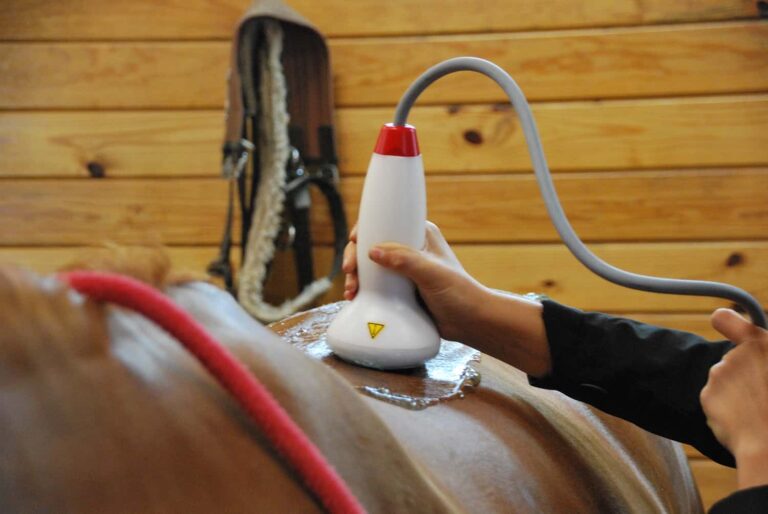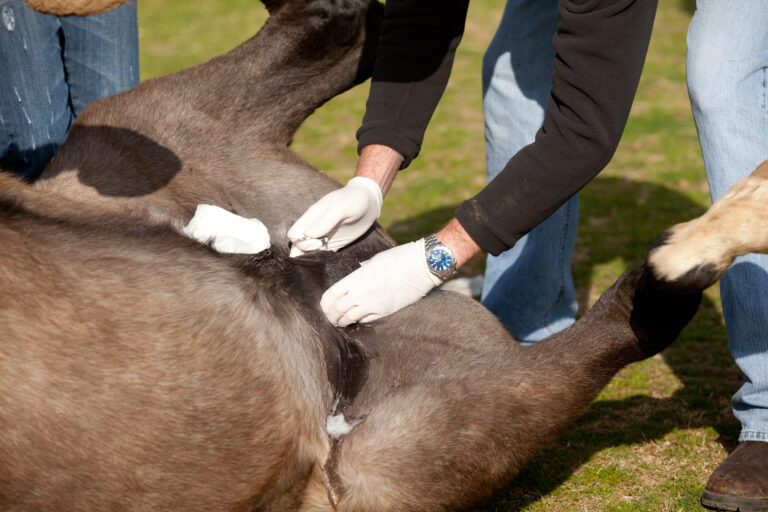
Top competitors in every discipline are focused on advancing to the FEI World Equestrian Games (WEG) Tryon 2018 at the Tryon International Equestrian Center in Mill Spring, North Carolina. The event will take place September 11-23. Veterinarians who care for horses at this level need to be aware of changes in regulations that occurred January 1, 2018, or that will take effect July 1, 2018.
Mike Tomlinson, DVM, MBA, is president of the Veterinary Commission I for the 2018 World Equestrian Games. He also is a Course Director for the Fédération Équestre Internationale (FEI). He teaches the veterinary courses. Every veterinarian who serves as an official for the FEI must take this course every four years.
This is also true for endurance veterinarians as of early 2018. “Endurance vets used to have to take the test every two years,” he explained. “As of the last couple of months, they only have to take it every four years. The FEI hasn’t been able to get that word out very well yet.”
Veterinary Official Cards
This is the first point where veterinarians need to sit up and take notice. Current veterinary official cards are only good for four years. “Originally, five years ago, the cards were good for five years,” said Tomlinson. “Then they changed the rules, so now the vet cards for officials are only good for four years.” The FEI runs almost everything on a four-year cycle, based on the Olympic calendar.
Tomlinson encouraged all FEI veterinary officials to go to the FEI website and look up the expiration dates of their cards . “It is good for four 12-month periods … 48 calendar months,” explained Tomlinson of the new rule. “If you got it on February 15, 2016, then it will expire February 14, 2020. But I encourage veterinarians to not just look at your physical card, since a lot were misprinted. Go on the FEI website and look up the expiration date.”
Changes in Treatment Paperwork and Rules
“Veterinarians need to know that the rules regarding medication forms that we have had for the last 10 years have changed,” said Tomlinson of the treatment regulations and paperwork. “Now the old Form 1 is Form A, and the old Form 3 is Form B. Forms 2 and 4 were eliminated … done away with. What you used to have to ask permission for on Form 4, there is no such thing anymore; so you don’t have to ask permission.”
Tomlinson explained the rule change with this example: “If I want to give Adequan to my client horse in the FEI barn and I am a private treating vet and have my FEI card, before the rule change I would not have been allowed to take a needle and syringe into the FEI stabling barn until I filled out Form 4 and turned it into an FEI vet. Now you don’t have to ask permission. A Permitted Treating Veterinarian (PTV) can go in the FEI stabling and can have needles and syringes and drugs. A year ago, they were not allowed to without written permission.
“If a non-vet or a vet who does not have a treating vet card is found with needles, syringes or medication in FEI stabling, that horse may be eliminated from that competition,” he said.
“The new rules really relaxed things in the right way,” Tomlinson said. He added that the FEI feels like if it gives veterinarians this ability, then it is also saying, “Don’t mess with us. Do it right.”
Tomlinson noted that this is a dramatic paperwork reduction and that it entirely changes how things are done at FEI events. “Previously you could not take medications or anything into a security area. Now vets are allowed to keep it with them,” he said. “The FEI is acknowledging that vets are professionals.”
According to Tomlinson, the new regulations show the FEI’s support— that the organization wants horses to be treated appropriately in the stables. “By appropriately, we mean things that will help the horse perform to the best of its ability, not to perform over and above that,” he added. “We want to provide a level playing field while supporting the equestrian athletes.”
Another example Tomlinson gave dealt with the administration of Regu-Mate, which previously required a request for treatment using Form 2. But now there is no Form 2. “Now you don’t have to declare Regu-Mate said Tomlinson. “With Form 2, we were confirming it was a mare; you no longer need to do so with paperwork at every event.”
The reduction in forms will mean massive time savings for treating veterinarians and FEI veterinary officials. “It’s huge not to have Forms 2 or 4,” explained Tomlinson. “80% of previous forms submitted were Form 4, and in some shows, the percentage was higher than that! This is a dramatic paperwork reduction and a change in how things are done.”
He added, “One of big things that enabled the FEI to do this relaxation of the security area is that the competitor’s veterinarian now is considered an additional person responsible. That means if a horse comes up positive [for a restricted drug], then it will be the rider, owner, trainer and vet who are potentially on the hook.
“That is exactly the way it should be,” summarized Tomlinson.
FEI Now Requires Cards for Therapists
If you are a treating veterinarian who also does therapy, you are covered by the FEI under your PVT licensing for conducting therapy at FEI-sanctioned events with approved devices and equipment, noted Tomlinson.
However, if you are not a licensed veterinarian and you do therapy on horses, “You now have to be registered with the FEI. There is an application on the FEI website (http://inside.fei.org/fei/ your-role/veterinarians/pet_sign-up) and further information online (http:// inside.fei.org/fei/your-role/veterinarians/ permitted-equine-therapists),” he said.
Tomlinson said that Permitted Equine Therapists need to have all the paperwork filled out and submitted ASAP in order to be carded and to perform therapy work at FEI events.
Veterinarians who work with therapists— or those with therapists in their practices who work on FEI-level horses— need to make sure that those people get registered with the FEI.
An FEI-recognized therapist is going to receive credentials that will allow him or her to use any legal modality in FEI stabling because that person is a carded professional, explained Tomlinson. He said that the FEI is trying to elevate the status of the therapist to that of a recognized profession.
However, in the United States, there is no such thing as a “licensed equine therapist.” Tomlinson explained that the FEI is facing the challenge of how to consistently decide who is a professional therapist and who isn’t. This is in contrast to veterinarians who are licensed in the areas where they practice.
Tomlinson said that the change to requiring an FEI card for therapists really “dovetails” into trying to reduce restrictions on carded professionals.
“The intent is to say, ‘You are a professional; you know what you are doing; go do it!’ ” explained Tomlinson. On the other hand, if you don’t meet the criteria, then you are not a recognized professional and are not allowed in FEI stabling.
Anyone applying for an FEI Permitted Equine Therapist card should read the Codex for those persons (http://inside.fei.org/system/files/PET%20Codex.pdf).
Permitted Equine Therapists’ Codex
1. Permitted Equine Therapists must ensure that at all times the horse’s welfare and health are prioritized according to the FEI Code of Conduct for the Welfare of the Horse, the FEI Veterinary Regulations, the FEI General Regulations, the FEI Equine Anti-Doping and Controlled Medication Regulations and any other applicable rules or regulations.
2. Permitted Equine Therapists must continually be aware of both human and equine safety.
3. Permitted Equine Therapists must act in compliance with all applicable local and national laws.
4. Permitted Equine Therapists must not work in any official capacity during the Event regardless of any FEI Official function they may hold.
5. Permitted Equine Therapists must not compete in the Event or any other competition taking place on the Event site while working as a Permitted Equine Therapist.
Read the Rules!
Part of getting an FEI veterinary or therapist card is that you have read and understood the FEI rules, noted Tomlinson. Both carding processes require that the individual take a test to show that he or she knows what is legal and what is not legal.
It is easy to obtain PDF downloads of all the FEI rules, including general rules, rules for each discipline and rules for veterinarians.
Visit http://inside.FEI.org (no “www”) and click on the “Rules” tab on the top. A drop-down menu that includes all disciplines, as well as veterinary and general rules, will appear. If you are a veterinarian, you should read at a minimum the general, veterinary and discipline-specific rules.
“The vet rules have been rewritten for this year [2018], so it is easier to find things,” said Tomlinson. “They hadn’t been completely rewritten for 10 years. It is much easier to understand the rules now.”
The FEI rules as of January 1 are much more specific about which modalities are legal, he explained. The FEI is trying to be more specific when it comes to modalities, but “it is difficult, because if the FEI outlaws something by name, then the modality companies just change the name,” Tomlinson added. “So they are trying to do it by treatment modality method rather than by brand name.
“The FEI is trying to allow as many modalities as we can, as well as to list those which are outlawed,” he stated. “We want to make it so that licensed vets and therapists can easily understand how they may help the horses.”
Click here for complete health and veterinary aspects of #Tryon2018. Coverage of the FEI World Equestrian Games™ Tryon 2018 is brought to you by KindredBio.




